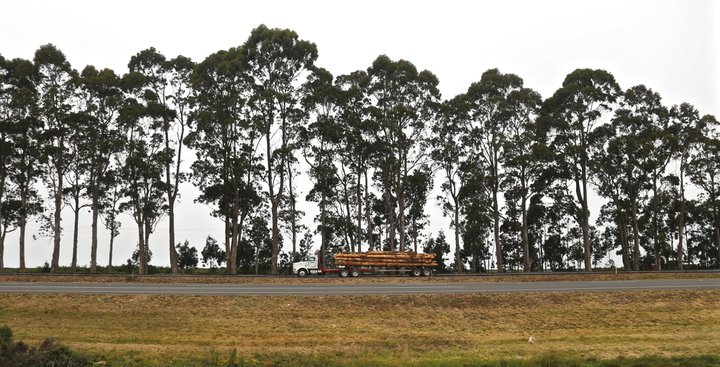
Should they stay or should they go, now? Photos Andrew Goff
The northern patch of eucalyptus trees lining highway 101 between
Arcata and Eureka might be cut down. Humboldt County Department of Public
Works is telling the Board of Supervisors that, in order to complete
the Humboldt Bay Trail — a proposed multi-use trail connecting towns surrounding Humboldt Bay —
over 200 of these trees must be removed. Some people say this is not
acceptable.
“Generations of people in Humboldt have grown up with these trees,” said Cutten resident and Keep Eureka Beautiful member Michelle McKeegan. McKeegan is among a group of individuals who strongly oppose the proposed plan to remove around 40 percent of the Eucalyptus trees standing between the highway and the bay. To be clear:

Image from CEQA Comment Evaluation memo
In a recent CEQA comment evaluation memo, Humboldt County Department of Public Works acknowledge that they received many comments opposing removal of the trees. While taking the comments into consideration, the department stands firm, recommending that bay trail plan be terminated if the northern portion of the trees are not removed.
The CEQA memo cites safety as the department’s primary concern. From the memo:
Based on the proximity of the mature eucalyptus trees to the proposed trail, and the fact that several trees are leaning toward the trail, there is a high likelihood that falling limbs or a toppled tree could strike the trail, and a high likelihood that such an incident would result in severe consequences if a trail user is present at the point of impact.”
Public Works Environmental Services Deputy Director Hank Seemann told the Outpost that the eucalyptus trees present potential danger that outweighs their positive attributes.
“I think one big distinction between eucalyptus trees and all others, is eucalyptus have a documented history of releasing limbs with no visual defects,” Seemann said.
Seemann explained that these potential falling limbs could not only be a safety risk, but also a legal issue for the county. It would be different if the trees were in a forest, but there is an extra burden on the department to evaluate the safety of a man-made facility being built next to planted trees.

The CEQA report also evaluated aesthetics, biological resources and cultural resources. Seeman told the Outpost that the threshold of significance for all these factors was set for a removal of more than half the trees. Since it is less than half the trees being removed, they determined the effect on these factors would not be significant.
President of the Eureka Heritage Society Mary Ann McCulloch told the Outpost she does not agree with this evaluation and feels the environmental impact report does not thoroughly consider the cultural and historic significance of the trees, which were planted almost 100 years ago by Henry DeVoy.
McCulloch sent a letter to the Humboldt County Board of Supervisors, citing a National Register Bulletin which defines Rural Historic Landscapes as “a geographical area that historically has been used by people, or shaped or modified by human activity, occupancy, or intervention, and that possesses a significant concentration, linkage, or continuity of areas of land use, vegetation, buildings and structures, roads and waterways, and natural features.”
McCulloch says that the eucalyptus trees absolutely fit this definition.
McCulloch also pointed out that Caltrans recognized the significance of the trees and decided not to remove them during an improvement project for the safety corridor back in 2008.
Seemann told the Outpost that the circumstances of that project were different. Because of the nature of the Humboldt Bay Trail project, safety concerns have to be paramount.
“The bay trail will really be a transformative project. It’s going to liberate people from traveling between the cities in a vehicle,” Seemann said. “We don’t want a facility that has compromised safety concerns that become a deterrent from its intended use.”
The Humboldt County Board of Supervisors will consider the Public Works recommendation at a meeting on July 31. McCulloch and McKeegan encourage everyone to attend and voice their opinions on this issue.

CLICK TO MANAGE